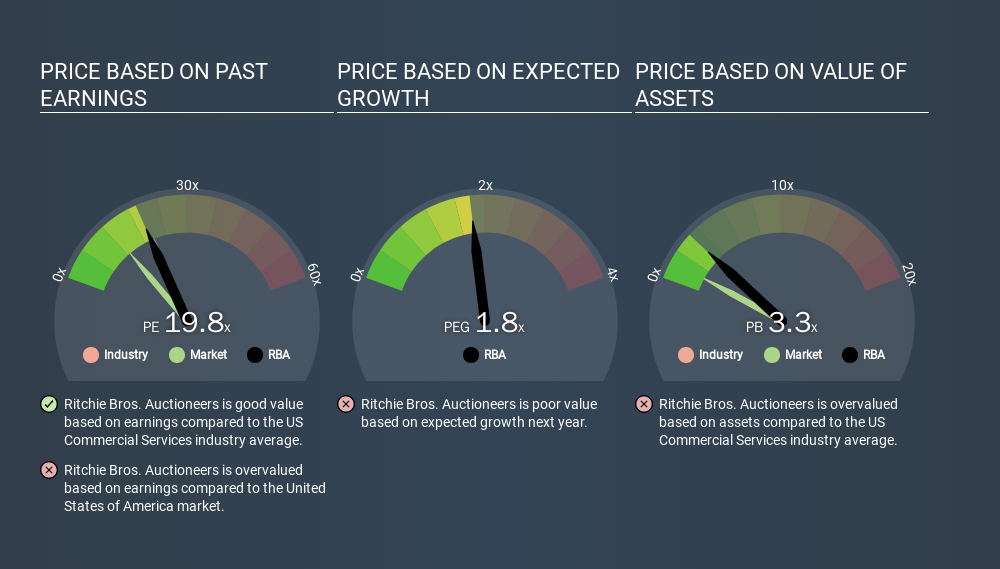- United States
- /
- Commercial Services
- /
- NYSE:RBA
A Sliding Share Price Has Us Looking At Ritchie Bros. Auctioneers Incorporated's (NYSE:RBA) P/E Ratio
To the annoyance of some shareholders, Ritchie Bros. Auctioneers (NYSE:RBA) shares are down a considerable 37% in the last month. Even longer term holders have taken a real hit with the stock declining 20% in the last year.
All else being equal, a share price drop should make a stock more attractive to potential investors. While the market sentiment towards a stock is very changeable, in the long run, the share price will tend to move in the same direction as earnings per share. The implication here is that long term investors have an opportunity when expectations of a company are too low. One way to gauge market expectations of a stock is to look at its Price to Earnings Ratio (PE Ratio). Investors have optimistic expectations of companies with higher P/E ratios, compared to companies with lower P/E ratios.
See our latest analysis for Ritchie Bros. Auctioneers
How Does Ritchie Bros. Auctioneers's P/E Ratio Compare To Its Peers?
Ritchie Bros. Auctioneers's P/E of 19.75 indicates some degree of optimism towards the stock. You can see in the image below that the average P/E (17.8) for companies in the commercial services industry is lower than Ritchie Bros. Auctioneers's P/E.

That means that the market expects Ritchie Bros. Auctioneers will outperform other companies in its industry. Shareholders are clearly optimistic, but the future is always uncertain. So further research is always essential. I often monitor director buying and selling.
How Growth Rates Impact P/E Ratios
P/E ratios primarily reflect market expectations around earnings growth rates. If earnings are growing quickly, then the 'E' in the equation will increase faster than it would otherwise. And in that case, the P/E ratio itself will drop rather quickly. A lower P/E should indicate the stock is cheap relative to others -- and that may attract buyers.
Most would be impressed by Ritchie Bros. Auctioneers earnings growth of 22% in the last year. And it has bolstered its earnings per share by 10% per year over the last five years. So one might expect an above average P/E ratio.
Don't Forget: The P/E Does Not Account For Debt or Bank Deposits
One drawback of using a P/E ratio is that it considers market capitalization, but not the balance sheet. Thus, the metric does not reflect cash or debt held by the company. The exact same company would hypothetically deserve a higher P/E ratio if it had a strong balance sheet, than if it had a weak one with lots of debt, because a cashed up company can spend on growth.
Spending on growth might be good or bad a few years later, but the point is that the P/E ratio does not account for the option (or lack thereof).
Is Debt Impacting Ritchie Bros. Auctioneers's P/E?
Ritchie Bros. Auctioneers has net debt worth just 9.8% of its market capitalization. It would probably trade on a higher P/E ratio if it had a lot of cash, but I doubt it is having a big impact.
The Bottom Line On Ritchie Bros. Auctioneers's P/E Ratio
Ritchie Bros. Auctioneers has a P/E of 19.8. That's higher than the average in its market, which is 11.8. While the company does use modest debt, its recent earnings growth is very good. Therefore, it's not particularly surprising that it has a above average P/E ratio. Given Ritchie Bros. Auctioneers's P/E ratio has declined from 31.2 to 19.8 in the last month, we know for sure that the market is significantly less confident about the business today, than it was back then. For those who prefer to invest with the flow of momentum, that might be a bad sign, but for a contrarian, it may signal opportunity.
When the market is wrong about a stock, it gives savvy investors an opportunity. As value investor Benjamin Graham famously said, 'In the short run, the market is a voting machine but in the long run, it is a weighing machine. So this free visual report on analyst forecasts could hold the key to an excellent investment decision.
But note: Ritchie Bros. Auctioneers may not be the best stock to buy. So take a peek at this free list of interesting companies with strong recent earnings growth (and a P/E ratio below 20).
If you spot an error that warrants correction, please contact the editor at editorial-team@simplywallst.com. This article by Simply Wall St is general in nature. It does not constitute a recommendation to buy or sell any stock, and does not take account of your objectives, or your financial situation. Simply Wall St has no position in the stocks mentioned.
We aim to bring you long-term focused research analysis driven by fundamental data. Note that our analysis may not factor in the latest price-sensitive company announcements or qualitative material. Thank you for reading.
About NYSE:RBA
RB Global
Operates a marketplace that provides insights, services, and transaction solutions for buyers and sellers of commercial assets and vehicles worldwide.
Excellent balance sheet with proven track record and pays a dividend.
Similar Companies
Market Insights
Community Narratives




